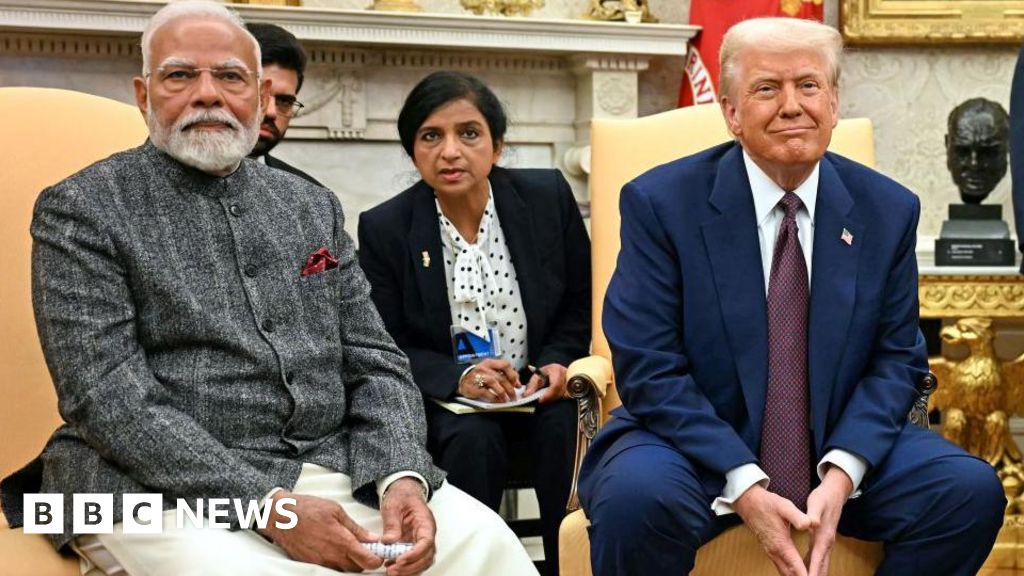ARTICLE AD BOX
By Aleem Maqbool
Religion editor, BBC News, Iqaluit
Inuit residential school survivor recalls 'haunting' first night
During his trip to Canada, Pope Francis said sorry, he talked about begging for forgiveness. That in itself fulfilled one of the "calls to action" laid out by indigenous people.
But throughout this visit, the Pope faced criticism that he did not do more to fulfil other demands and to take more tangible steps to make amends for the Catholic Church's role in the oppression, mistreatment and cultural genocide of indigenous people in Canada.
Those demands have long been communicated to the Pope. Among them, reparations and investment, accountability for those who perpetrated abuse at Catholic-run schools, and the return of sacred indigenous artefacts from the Vatican.
"Lives have already been lost. You couldn't just get over it," says Edna Elias, who was one of the estimated 150,000 indigenous children taken far from her family to a church-run residential school.
"Sure, apologies were made," Edna said through tears, "that's fine. But those are words."
She talked of the abuse she faced from the age of six and the way in which she was made to forget her Inuit culture and language, but she also tells of the many other ways her life has been governed by the fact she is indigenous.
"Even before school, I was labelled as W2 783: W meaning western Arctic region number 2, the 783rd Eskimo registered from that region. And so they gave us little tags to wear around our necks, we were labelled like with dog tags."
Image source, Reuters
Image caption,Indigenous people in Canada have urged the Pope to rescind the Vatican's Doctrine of Discovery
For many indigenous people, that kind of treatment leads directly back to the Vatican, and to another key demand that was not met on this trip.
Moments before Pope Francis was due to lead Mass just outside Quebec City, two people made their way to the front and stood before the altar, unfurling a large banner that said "Rescind the doctrine." Their protest ended calmly and quickly.
The doctrine they were referring to originated from 15th Century edicts from the Pope. To outsiders it may seem an abstract focus for a demonstration but for a lot of indigenous people, not just in Canada but in the US, South America, Australia and elsewhere, it is crucial.
The papal Doctrine of Discovery from the 1400s gave blessing to European colonisers to seize land that was not inhabited by Christians. Non-Christians were, in effect, deemed savages.
Chief Ghislain Picard, the regional chief of the Assembly of the First Nations for Quebec-Labrador, met the Pope on this visit.
He has been pleased with the conversation that has taken place and the awareness of indigenous issues that has been raised during the papal trip, but repudiation of the Doctrine of Discovery is important to him.
"Among the First Nations, principles are important. Rescinding the doctrine would demonstrate that the Vatican is open and ready to compromise and review its own history. It might go back to the 15th Century, but it's still important today," he says.
Chief Picard lists the ways in which colonial attitudes to this day are holding back progress on indigenous rights, and feels that is rooted in the racist green light given to explorers by the Catholic Church.
"And it is broader than just Canada. Indigenous people from around the world are in conversation about the importance of the rescinding of this doctrine," says Chief Picard.
The papal edicts of the 15th Century had their origins in lobbying of the Pope by European monarchies who wanted legitimacy for their expansion and their creation of a slave trade.
They were later used as the basis to claim rights over land and resources that was not just used by Catholic explorers but other Europeans too, disregarding the presence of indigenous people.
Christian institutions around the world, including the Canadian Conference of Catholic Bishops, have now officially condemned the doctrine.
The most important institution of all as relates to the papal edicts has yet to do the same.
While the Pope certainly severely criticised policies of assimilation and cultural destruction linked to the doctrine, the Vatican says the matter of rescinding the proclamation is still under discussion.
Additional reporting by Sara Monetta

 2 years ago
68
2 years ago
68








 English (US) ·
English (US) ·